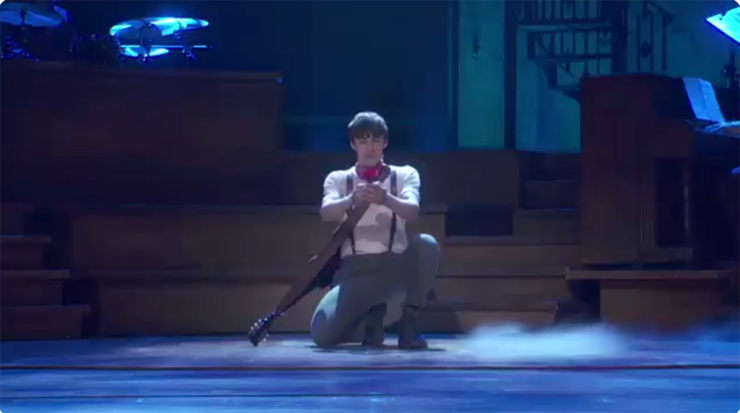If you are at all interested in the world of musical theater, you’ve probably heard about Hadestown, the most recent recipient of the Tony Award for best new musical. If you aren’t, I promise that it’s something worth knowing about. The Original Broadway Cast Recording was finally made available in its entirety at the end of July, so even if you can’t make it to New York during its run, you can still appreciate its wild accomplishment.
Hadestown is a decade-in-the-making collaboration between singer-songwriter Anaïs Mitchell and stage director Rachel Chavkin. Beginning as a folk-opera that Mitchell worked on between 2006 and 2010, it made its off-Broadway debut in 2016 at the New York Theater Workshop. From there it moved to Edmonton and London with major rewrites and finally made it to Broadway in March of this year.
At its heart, Hadestown is a retelling of the Greek myth of Orpheus and Eurydice, a story you likely know well. Here is a brief refresher for those of you who are unfamiliar (complete with spoilers for a 2000+ year old piece of foundational European mythology): The myth focuses on Orpheus—a musical and poetic wunderkind and son of Calliope, the muse of epic poetry—and Orpheus’ wife, Eurydice. Eurydice is sexually assaulted by a satyr and, in trying to escape her attacker, falls into a viper’s nest and is fatally bitten. Distraught at the loss of his wife, Orpheus descends into the underworld to beg Hades, the god of death, and his wife, Persephone, to return her to him. He sings so beautifully that the gods relent and allow Eurydice to return…on the condition that Orpheus never look back, as he walks back toward the mortal world, to check if his wife is following behind him. Orpheus fails the test, and Eurydice goes back down to the underworld; Orpheus, consumed by grief, vows to worship only Apollo, the god of music. Followers of Dionysus, the god of sanity-shredding parties and Orpheus’ previous patron, tear him to pieces for betraying their deity.
In adapting the myth to the Broadway stage, Mitchell and Chavkin make a number of timely and fascinating alterations. Chief among them is a change in setting. Though the musical is playfully anachronistic and contains a number of fashion, auditory, and set cues that clearly place it outside of any real place or time, the musical is most reminiscent of a Great Depression-era America. The Greek underworld (also called Hades, like the god that rules over it) is now “Hadestown,” an underground corporate mining town at the end of a long railroad dubbed “the road to hell.”
In Mitchell and Chavkin’s retelling, there are no similes, only metaphors. Hades (Patrick Page) and Persephone (Amber Gray) are still called gods even though they are also represented as the capitalist fat-cat of Hadestown (it’s worth noting that Pluto, the Roman reimagining of Hades, is also the god of wealth) and his drunk but dispirited wife, respectively. Similarly, Orpheus’ mentor, “Mr. Hermes” (the inimitable, and Tony Award-winning, André De Shields), is simultaneously the eponymous Greek god of commerce, magic, and crossroads, a wise old member of the starving roadside community where Orpheus lives, and a Hoodoo “black man” (sometimes characterized as the Crossroads Devil) who facilitates deals for desperate bluesmen. Orpheus himself (Penny Dreadful’s Reeve Carney) is described literally as “a muse’s son” but is also described, simply as “a poor boy with a lyre.” Eurydice (Tony Award-winner Eva Noblezada) is, as always, a “hungry young girl.” But beyond the setting, what Hadestown really does for the myth is transform its core tragedy from a story about the sadness of a talented man with a fridged wife to one about the horrors of capitalism, and the impossibility of art to transcend those horrors.
This is achieved in a few key ways. First, Eurydice is no longer the victim of assault who dies as the indirect result of unwelcome sexual advances. Instead, Mitchell’s lyrics pitch her as a consummate survivor who, despite her deep love for Orpheus, knows that his poetic talents aren’t enough to keep them happy and fed. When Orpheus abandons her in a storm to work on his magnum opus, Hades seduces her with promises of work and food and she makes the pragmatic decision:
Orpheus, my heart is yours
Always was and will be
It’s my gut I can’t ignore
Orpheus, I’m hungry
Oh, my heart, it aches to stay
But the flesh will have its way
Oh, the way is dark and long
I’m already gone, I’m gone
By making Eurydice’s “death” her own decision to survive rather than a tragic referendum on her beauty and femininity, Hadestown guts the most repellant part of the myth wherein the doubly disenfranchised character (both a woman and the only mortal in the original myth) is an agency-lacking pawn whose ownership is contested twice over without her input.

The second major change is Mitchell’s almost equal focus on the other couple in the myth. Hades and Persephone get plenty of stage time and, though some of their most poignant moments were cut between the Edmonton and Broadway versions of the play, they remain equally tragic. They are written as an older couple who have fallen out of love.
This is, in and of itself, another important alteration from the underlying mythology. You may recall that Persephone begins her mythical existence as Kore, the maiden goddess of vegetation and spring. She is abducted by her uncle, Hades, and brought to the underworld where she eats half the seeds of a pomegranate and thus is forced to spend half the year as his wife. Her mother, the harvest goddess Demeter, spends the months of her forced marriage in mourning, accounting for the seasonal cycle of crops. Most classical and Renaissance statues of Persephone depict her as helpless maiden, in the midst of being abducted. One need only look to the horrifying (but beautifully carved) Bernini sculpture, “Il Ratto di Prosperina” (The Rape of Persephone), to see the model for modern interpretations of the myth
By changing Hades and Persephone into a couple struggling to remember why they loved one another in the first place, Mitchell opens up the possibility for a redemptive reinterpretation where Hades is not a violent aggressor and Persephone is not a hapless victim. It may seem counterintuitive that erasing the violence of Hades and Persephone’s first meeting centers, rather than erases, the agency of the goddess of the underworld. But where our standard interpretations of the myth lend themselves to tales of domestic abuse, spousal rape, and forced marriage, Mitchell’s version allows Persephone to be defined by something other than her suffering. In a verse that existed in the Live Original Cast Recording but was ultimately cut in the Broadway version, Persephone opines about that loss of love to Eurydice:
Love was when he came to me
Begging on his bended knees
To please have pity on his heart
And let him lay me in the dirt…I felt his arms around me then
We didn’t need a wedding bed
Dark seeds scattered on the ground
The wild birds were flying aroundThat’s when I became his wife
But that was in another life
That was in another world
When I was a young girl!
This is not only a boon to Persephone—now allowed to be a fully-fledged character who returns to Hadestown not out of forced, contractual bondage but out of waning fealty to a marriage in crisis—but also to Hades who, freed from an impossible-to-sympathize-with characterization as a monstrous rapist, is allowed to be a flawed, powerful man who has a chance to be redeemed by his belief in the love of Orpheus and Eurydice.
By making these two love stories parallel, Hadestown is able to blunt the all-too-common impact of Orpheus as the world’s-perfect-romantic. He can be passionate and naive in equal measure. Here, he is capable of narcissism and lack of empathy without the show insinuating that the power of his love somehow renders those flaws moot. There may be no similes in Hadestown, but the expansion of character motivations allows the audience to sidestep a reductive debate over the show’s ultimate message when it comes to the power of love.
Adding to that set of complications is the show’s emphasis on capitalism, climate change, and the insufficiency of art to overpower either of them. As mentioned above, the Roman reinterpretation of Hades, Pluto, casts him as the god of wealth and precious ore as well as the ruler of the lands of the dead. Hadestown plays with this characterization by making the eponymous city a mining town lorded over by a boss in tailored suits and silver chains who gives every outward impression of being a wealthy industrialist.
Buy the Book


Silver in the Wood
This is furthered by Hades’ own obsessions with industry. The anachronistic setting of Hadestown lets him wax grandiloquent on a variety of industrial ventures, from oil-drilling to power plants to foundries. Persephone punnily notes that the place is “hell on earth:” a too-hot, too-bright “neon necropolis” whose solution to poverty is endless, mindless work, devoid of artistry or fulfillment. This is, in fact, Mitchell and Chavkin’s reinterpretation of the River Lethe. In Greek mythology, drinking from the Lethe—named for the goddess of Oblivion—caused one to forget oneself and live untroubled by thoughts of one’s former life in the world above. When Eurydice reaches Hadestown, the show describes her, not as dead, but as “dead to the world,” having exchanged her hunger and want for the cold comforts of capitalism and purpose. The Fates invoke Lethe more directly in this moment, singing:
Down in the river of oblivion
You kissed your little life goodbye
And Hades laid his hands on you
And gave you everlasting life!
And everlasting overtime
In the mine, the mill, and the machinery
Your place on the assembly line
Replaces all your memories
Mitchell’s lyrics explicitly swap out the fear of mortality for the fear of a life spent in the thrall of mindless labor. In Hadestown, the cruelty of life is not that it ends but that it is spent on an endless cycle of bare subsistence.
This is made most clear in the first act finale when Hades engages in a haunting call and response number entitled “Why We Build the Wall” where he indoctrinates his workers with capitalist rhetoric as they work on the River Styx—here reimagined as an endless wall that separates the living world from the dead.
What do we have that they should want?
We have a wall to work upon
We have work and they have none
And our work is never done […]
And the war is never won!
The enemy is poverty
And the wall keeps out the enemy
And we build the wall to keep us free
That’s why we build the wall
Work is intentionally hard and dehumanizing in Hadestown, robbing people of their individuality and filling them, instead, with a jingoistic desire to fight an imagined foe whose enmity is the jealousy of the wealth generated in the fight. It is a confusing, circular logic that condemns the entire capitalist system. Where Mitchell and Chavkin depart from many folk critiques of capitalism, however, in the overwhelming inescapability of the system. Hades’ desire to create capital goes nowhere as he, first and foremost, uses industry as a way of distracting himself from the collapse of his marriage. He is privileged and wealthy but nevertheless unable to derive happiness from that wealth. It is telling that he is never described as greedy. Hadestown’s take on capitalism is that it is a system of purposeless asceticism, a self-created thing that replicates without improvement.
The critique of capitalism is scathing, but Mitchell and Chavkin offer no pat solution. The traditional interpretation of the Orpheus story sets up either love or art as the ameliorative to the cruelty of Hades. It is the love or the artistry that transcends death and, in Hadestown, it could be the love or the artistry that transcends capitalism… Except that it isn’t. The Orphic myth always ends the same way and Hadestown is no exception. It is a testament to the power of the show that multiple reviews remark upon the audible gasps from the audience when Orpheus, inevitably, turns and condemns Eurydice to an eternity of toil and himself to an eternity of loneliness.
As to what audiences are to take away from Hadestown’s ruthless dedication to keeping the tragic crux of the myth entirely intact is, of course, open to debate. All of the show’s triumphant music, normally associated with a Broadway finale, comes right before the fateful trek out of the underworld. From there on out, the show is a quiet, tragic, march towards the curtain. It closes on Persephone singing a hymn to Orpheus, saying only:
Some flowers bloom
Where the green grass grows
Our praise is not for them
But the ones who bloom in the bitter snow
We raise our cups to them
Attempting to make a difference in the face of adversity is admirable even if it is doomed to failure. Hermes explains in an earlier number that the point of the repetition of “an old song from way back when” is “to know how it ends/ And still begin to sing it again/ As if it might turn out this time.”—a sort of gallows hope that the cycle might be broken.
In the end, Hadestown does what the best reinterpretations of well-known myths and tales do: it gives weight and depth to its stock characters while forcing its audience into a near-Talmudic-levels of deliberation over what the wisdom of the ages might hold when we eschew the easiest answers. In a way, that is the best of what well-worn fantasy tropes can offer as well. And if it can be done in song, well…so much the better.
Tyler Dean is a professor of Victorian Gothic Literature. He holds a doctorate from the University of California Irvine and teaches at a handful of Southern California colleges. He is one half of the Lincoln & Welles podcast available on itunes or through your favorite podcatcher. More of his writing can be found at his website and his fantastical bestiary can be found on Facebook at @presumptivebestiary.










